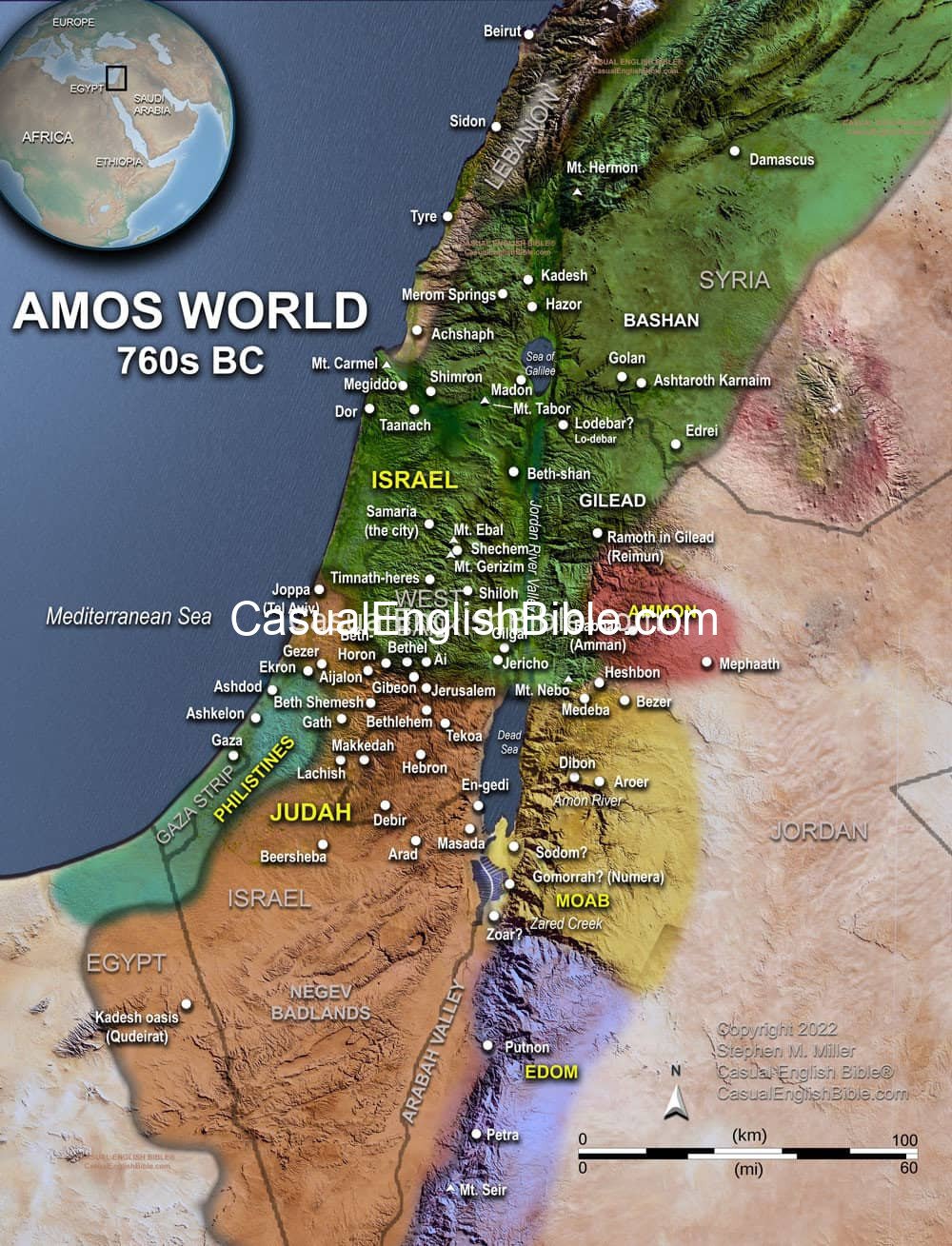Amos 7
Visions of the fig farming prophet
Vision of swarming locusts
1The LORD God showed me a vision of locust [1] swarms he was creating. This was just after the first harvest, which went to the king. [2] Sprouts of the second planting were just beginning to grow.2I watched as locusts ate all the plants. Then I said, “Oh no. LORD God, please forgive them. Israel [3] is just a small nation. How can it survive something like this?”
3The LORD agreed to my request. He said, “Okay then, it won’t happen.” [4]
Vison of worldwide fire
4The LORD God showed me another vision. He was ordering a rain of fire that would destroy everything on the land and in the sea. 5I said, “No. Stop. LORD God, please. Israel is small. How can it survive this?”6The LORD God agreed to do as I asked. He said, “It won’t happen.”
Vision of a Israel, as a crooked wall
7The LORD showed me another vision. He was standing beside a wall under construction. Beside the wall he held up a string with a small weight on the bottom—a plumb line. [5]8The LORD said, “Amos, what do you see here?” I said, “It’s a plumb line.” The LORD said, “I want you to understand what I’m doing to Israel. I’m seeing if they measure up. And I’m telling you they don’t. I won’t overlook it anymore. 9Every sacred site in Israel will be destroyed. Worship centers. [6] Holy places from the time of Isaac. [7] All will turn into ruins. I’m going to bring my sword to Israel. And I’m going to cut off Jeroboam’s family dynasty, ending it once and for all.
Amos to priest: Your wife will become a hooker
10Amaziah, the priest at Bethel, reported Amos to the king. Amaziah said, “Amos is plotting against you. And he’s doing it right here in the heart of Israel. He has already said too much. 11He’s telling everyone, ‘Jeroboam is going to die by the sword and Israel will have to go into exile in a foreign land.’”12Then, Amaziah told Amos, “Vision guy [8] get out of here. Take your visions back to Judah. Make your money predicting the future there. 13But don’t ever prophesy here in Bethel again. The king worships at this temple. It’s a sacred place of worship for the entire nation.”
14Amos told Amaziah, “I’m not a prophet. I’m not even related to one. I’m a herder and a farmer. I tend an orchard of sycamore fig trees. 15The LORD told me to leave my flock. He said, ‘I have some messages for my people in Israel. And I want you to deliver them.’ 16So here I am. Now I have a message from the LORD to you. You told me, ‘Don’t say anything bad about Israel. No judgmental preaching or prophesying against Isaac’s descendants.’
17For that, the LORD says you’ll lose your land; people will divide it among themselves. Your children will all die—sons and daughters, killed by the sword. Your wife will live, but as a hooker here in town. You, on the other hand, will live the rest of your life exiled in a foreign land far, far away.
Footnotes
Locusts are large, flying grasshoppers that mature into a more aggressive stage because of the constant friction in a crowded swarm. Grasshoppers usually live by themselves. But when weather conditions are right and predators such as birds are nowhere around, the population can explode. Crowded together, they can get very hungry and very agitated. When they swarm off to go hunting for patches of green, they can darken the sky.
Apparently Israel’s King Jeroboam (ruled 783-743 BC) kept the first harvest of grain for his royal granaries. Farmers harvest barley from around March to May. Sprouts of the second harvest could be growing around April or May, after the spring rains. If the king took the first harvest, the rest of the country depended on the second harvest. If the locusts were merely symbols, they could represent big trouble for the nation.
Literally, “Jacob,” father of the 12 sons whose families grew into the 12 tribes of Israel.
God changes his plans if not his mind. The philosophical question is how can an all-knowing God change his mind? If he knew it all, he wouldn’t have to. Another way to look at it: People change and God adjusts his plans accordingly. Perhaps one of God’s most famous reversals is when he ordered the prophet Isaiah to tell King Hezekiah he was a goner and that illness would take his life. Hezekiah prayed for God to give him a few more years. While Isaiah was still leaving the palace, God turned him around to tell the king his prayers were answered (Isaiah 38).
Builders use a plumb line to measure a wall, to make sure it rises straight up. If it starts to tip sideways, builders have to tear it down and do it right.
Israelites who lived in Judah worshiped in Jerusalem. Israelites up north in Israel worshiped at Bethel and Gilgal and possibly made trips far south, to Isaac’s home in Beersheba (Amos 4:4; 5:5).
Isaac was Abraham’s son and the father of Jacob. Those three men are widely considered fathers of the Jewish people. Isaac lived in Beersheba, on the southern boundary of livable land in ancient Israel. In Amos’s time, Beersheba was in the southern Jewish nation of Judah. Israel split in two after King Solomon died. The northern tribes kept the name of Israel.
The Hebrew word more literally means “seer,” someone who receives messages in a vision. Prophets fall into that category, but they can receive messages from God in other ways, too. Moses met with God, in person “one on one, just as someone talks to a friend” (Exodus 33:11).
Discussion Questions
- Sorry, there are currently no questions for this chapter.








